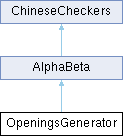Loading...
Searching...
No Matches
OpeningsGenerator Class Reference
This class is used in order to generate the openings. More...
#include <openings_generator.hpp>
Inheritance diagram for OpeningsGenerator:

Public Member Functions | |
| void | generateOpeningsWhite (int depth, std::ofstream *outFile) |
| void | generateOpeningsBlack (int depth, std::ofstream *outFile) |
 Public Member Functions inherited from AlphaBeta Public Member Functions inherited from AlphaBeta | |
| AlphaBeta () | |
| AlphaBeta (const std::vector< double > &player_to_win_value_, const std::vector< double > &player_to_lose_value_) | |
| ListOfPositionType | getMove (const int &depth, const double &alpha, const double &beta) |
| uint_fast64_t | getMove64 (const int &depth) |
| void | availableMoves (std::set< uint_fast64_t, decltype(comp_move_)> &result) |
| void | tensorflowSortMoves (std::set< uint_fast64_t, decltype(comp_move_)> &possible_moves) |
| const double | AlphaBetaEval (const int &depth, double alpha, double beta, const bool &maximizingPlayer, const bool &keepMove, uint_fast64_t hash) |
| bool | isHuman () |
| void | loadOpenings () |
| Player | getMaximizingPlayer () const |
| std::vector< double > | getPlayerToLoseValue () |
| std::vector< double > | getPlayerToWinValue () |
| void | setPlayerToLoseValue (const std::vector< double > &player_to_lose_value_) |
| void | setPlayerToWinValue (const std::vector< double > &player_to_win_value_) |
 Public Member Functions inherited from ChineseCheckers Public Member Functions inherited from ChineseCheckers | |
| ChineseCheckers () | |
| void | newGame () |
| bool | move (const Player &player, const ListOfPositionType &list_moves) |
| Result | stateOfGame () |
| void | moveWithoutVerification (const uint_fast64_t &move) |
| Player | getWhoIsToPlay () const |
| uint_fast64_t | getBitBoardWhite () const |
| uint_fast64_t | getBitBoardBlack () const |
| void | printGrid () const |
| void | printWhoIsToPlay () const |
Additional Inherited Members | |
 Public Attributes inherited from AlphaBeta Public Attributes inherited from AlphaBeta | |
| std::function< bool(const uint_fast64_t &, const uint_fast64_t &)> | comp_move_ |
| std::function< bool(const uint_fast64_t &, const uint_fast64_t &)> | comp_move_black_ |
| std::function< bool(const uint_fast64_t &, const uint_fast64_t &)> | comp_move_white_ |
 Protected Member Functions inherited from AlphaBeta Protected Member Functions inherited from AlphaBeta | |
| double | heuristicValue () |
| void | updateHeuristicValue (const uint_fast64_t &move) |
| void | updateHeuristicValueBack (const uint_fast64_t &move) |
| std::vector< uint8_t > | bitBoardsAsVector (const bitBoards_t &bb) |
| ListOfPositionType | retrieveMoves (const uint_fast64_t &move) |
 Protected Member Functions inherited from ChineseCheckers Protected Member Functions inherited from ChineseCheckers | |
| MoveType | elementaryMove (const PositionType &original_position, const PositionType &arrival_position) const |
| bool | isPositionIllegal () const |
| int | cantorPairingFunction (const int &x, const int &y) const |
| boost::unordered_map< uint32_t, bool > | loadIllegalPositions () const |
| void | generateZobristKeys () |
| void | computeAndSetZobristHash () |
 Protected Attributes inherited from AlphaBeta Protected Attributes inherited from AlphaBeta | |
| std::vector< double > | player_to_win_value_ |
| std::vector< double > | player_to_lose_value_ |
| Player | maximizing_player_ |
| uint_fast64_t | best_move_ |
| boost::unordered_map< uint_fast64_t, std::pair< double, int > > | transposition_table_ |
| boost::unordered_map< uint_fast64_t, std::pair< double, int > >::iterator | it_transposition_table_ |
| std::array< boost::unordered_map< bitBoards_t, uint_fast64_t, bitBoardsHasher, bitBoardsEqual >, 2 > | opening_ |
| cppflow::model * | model = new cppflow::model("model") |
| std::unordered_map< uint_fast64_t, double > | result_tensorFlow_ |
| double | heuristic_value_ |
| int | fullDepth_ |
| std::array< bool, 2 > | won_ = {false, false} |
 Protected Attributes inherited from ChineseCheckers Protected Attributes inherited from ChineseCheckers | |
| const uint_fast64_t | un_64_ = static_cast<uint_fast64_t>(1) |
| Player | who_is_to_play_ = 0 |
| bitBoards_t | bit_boards_ |
| uint_fast64_t | zobrist_hash_ |
| std::array< boost::unordered_map< uint_fast64_t, uint_fast64_t >, 2 > | zobrist_keys_ |
| std::array< boost::unordered_map< uint_fast64_t, uint_fast64_t >, 2 > | zobrist_keys_moves_ |
| boost::unordered_map< uint64_t, int > | number_of_times_seen_ |
| std::vector< uint64_t > | positions_seen_ |
| const uint_fast64_t | winning_positions_white_ = 0xF0E0C08000000000 |
| const uint_fast64_t | winning_positions_black_ = 0x000000000103070F |
| const boost::unordered_map< uint32_t, bool > | illegal_positions_ |
| const std::array< std::array< uint32_t, 8 >, 8 > | cantor_pairing_ |
| const std::vector< std::vector< int > > | valid_lines |
| const std::vector< std::vector< int > > | valid_lines_illegal |
| const std::array< std::pair< int, int >, 64 > | uint64_to_pair_ |
| const std::array< std::array< uint_fast64_t, 8 >, 8 > | int_to_uint64_ |
| const std::array< std::vector< uint_fast64_t >, 64 > | direct_neighbours_ |
| const std::array< std::vector< std::vector< std::pair< std::pair< uint_fast64_t, uint_fast64_t >, uint_fast64_t > > >, 64 > | k_neighbours_ |
Detailed Description
This class is used in order to generate the openings.
Member Function Documentation
◆ generateOpeningsBlack()
| void OpeningsGenerator::generateOpeningsBlack | ( | int | depth, |
| std::ofstream * | outFile | ||
| ) |
Generates the openings up to a given depth.
- Parameters
-
depth Defines the length of the openings we will compute. outFile Defines the file on which the openings must be written.
◆ generateOpeningsWhite()
| void OpeningsGenerator::generateOpeningsWhite | ( | int | depth, |
| std::ofstream * | outFile | ||
| ) |
Generates the openings up to a given depth.
- Parameters
-
depth Defines the length of the openings we will compute. outFile Defines the file on which the openings must be written.
The documentation for this class was generated from the following files:
- include/openings_generator.hpp
- src/openings_generator.cpp